What do taxis, cigars, horse drawn carriages and Buena Vista Social Club have in common?
Well, they’re firstly all seemingly integral parts of a tourist’s experience of Cuba. And second, they’re yours – for a price.
Understanding the great Havana hustle
Havana is the first port of call for the vast majority of tourists visiting Cuba. In fact, many of Cuba’s tourists only have the chaos of Havana to constitute their ‘authentic Cuban experience’ before they’re whisked away to one of the all-inclusive resorts of Varadero.
For the Cubans living in the capital, these tourists are a goldmine. Foreigners who don’t know the particular nuances of a new culture are invariably a lot easier to take advantage of – and that’s where the jineteros come in.
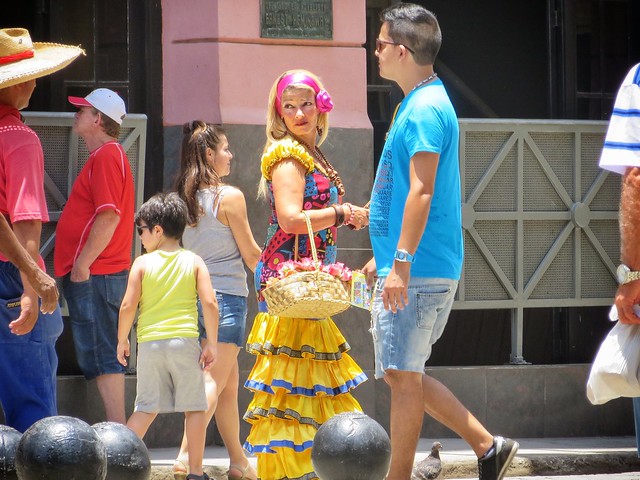
A Cuban woman just casually going for a walk in her ‘normal’ clothes. Keeping an eye out for any photographers she can request payment from.
The term ‘jinetero’ is slang for ‘sex worker,’ but in Cuba it’s used as a general term for street sellers – those people who stand on street corners and attempt to sell things to you. From cigars and Havana rum to accommodation and transport, absolutely anything goes. Including dressing the part and cashing in on the ensuing photo opportunities.
The culture of jineteros is widespread in Cuba – they appear in any place where tourists exist. But I found them to be the worst, the most prominent, and the most insistent, in Havana.
“Hola lady, you like cigar? You want taxi? You need casa?”
My Swedish friends and I stumbled through the narrow streets of Habana Vieja, clustered together in the strip of shade that fell across one pavement. A broad shouldered man approached us, his arm laid casually, possessively, around his female companion’s neck.
“Hola chicos! Where are you from? Come to see music with us! Buena Vista Social Club, only today!”
We shook our heads quickly, politely, and carried on walking. Memories of the same conversation in numerous different guises flitted through my head.
Earlier that morning, we’d taken a breather in a small plaza, sitting on stone steps to dutifully reapply suncream and gulp lukewarm water. Within seconds a man had crouched at our feet, holding a photocopied pamphlet in his hand.
All in one breath, he explained in excitable Spanish that a real member of Buena Vista Social Club – arguably Cuba’s most famous musical export to the international world – was performing with his fellow musicians that very evening. In a bar just around the corner! And we could get in for free because it was a one off festival event!
Cuban musicians. Definitely not from Buena Vista Social Club.
Unfortunately, the likelihood of actually seeing any members of the real Buena Vista Social Club play is quite small, seeing as there are multiple jineteros all over the city proclaiming different concerts in countless Havana bars…
When the guy eventually disappeared, he was replaced almost immediately by an old man. A strand of spit hung limply from his mouth, caught in his beard; he gestured to a bag of newspapers on his shoulder, and touched the smeared ink mutely.
My smile and immediate response of, “gracias, pero no lo quiero” didn’t make an impact. He was already sorting through the bundle, fingers landing on an English language version and pulling it out triumphantly. Paper laid across my sweating knees; the smiling images of Che Guevara and Fidel Castro emblazoned all over the souvenir.
Behind him, I caught sight of a young Cuban man smoking a cigar, watching us and smiling knowingly – twisting a finger at the side of his head in a clear “he’s crazy!” sign. Which I understood as soon as the old man slapped my knee rather forcefully. Clearly refusing to buy something a second time isn’t a good idea.
“This man was in the revolution!” The young guy said as he approached us. “He was like Che!”
Newspaper snatched from my lap, the muted ‘Che-like’ man was moving on to different potential customers. Time for the young guy full of praises for revolutionaries, who waved a laminated sheet in our faces. Horse drawn carriage rides, anyone?
Even as we stood to leave, I saw an eager guitarist making a beeline straight for us. Four different hustlers, all in the space of five minutes…
How to be a Havana jinetero
In the streets of Havana, it’s easy to play the Havana hustle game. If you’re running out of money or things to keep you occupied, try saying the words ‘cigar,’ ‘car,’ ‘casa,’ or ‘Buena Vista,’ and count how many men surround you at any given time.
They’ll either have light patter prepared to start with, or they’ll just launch straight into the hard sell. Because you must want new sunglasses, even though you have some on your head? How about a box of Romeo y Julieta cigars, absolutely guaranteed to be the real thing and not a set of cheap cigars rolled in fake brand paper? If not, you have to come to this guy’s sister’s friend’s casa, it’s the best one in Havana – or at least take a ride in his car??
The jineteros never really feel malicious or predatory but they are persistent, and it can make Havana a pretty exhausting place.
Even off the streets, the same thing happens; like walking through a museum at the height of the afternoon’s heat, when you smile at an elderly museum guide who sits in the corner of the room. She immediately stands, rifles through the wicker basket beside her and triumphantly pulls out a handmade doll with puffy skirts, “Viva Cuba!” emblazoned across the material.
My Swedish friends hung out with university students for a few hours, chatting about how they felt living in Cuba. The Swedes were amazed when, at the end of the conversation, the group of teens mentioned that it’s really expensive to buy academic textbooks and they have to club together, like six people for one book – could the Swedes help them out with some cash?
So why is hustling quite so common in Havana?
The difficulty lies in the reasoning behind the jinetero culture. The Cuban government’s tight laws and restrictions regarding employment mean Cuban citizens try a lot of unorthodox methods to earn money. And because Cuba uses two currencies in parallel, a local Cubano getting paid in tourist-designated CUCs (a currency directly equal to the US dollar) is way more preferable than receiving a wage in the much less valuable moneda nacional.
It’s also probably too tempting not to try it on with tourists, particularly in Havana. I watched people willingly sitting down on small wooden stools to get their hair braided in Calle Obispo; discussing prices for old coins and badges sporting Che’s face and the Communist flag; and taking photos of the exotically dressed women in Plaza las Armas who nonchalantly smoke fat cigars and spread their palms for a payment afterward.
Cubans are well known for embracing opportunity, too; like when I fumbled for my camera to capture the three large, wet fish hanging by their mouths from metal hooks against a brick wall, and a woman walked swiftly into my line of vision proclaiming that they only cost a peso each.
Sensing a potential sale before the tourist has even conceived of the idea.
The walking wallets of Havana
On my last day in Cuba I walked through the crowds on Calle Obispo, enjoying the early evening sun and soaking up images from the street. A busker with two homemade puppets, a group of little girls dancing beside them. A sleepy dog stretched out on the stones, with an ID tag, complete with photo, tied around his neck.
A man had started to speak to me, but I’d ignored it. In Calle Obispo, a central point of Havana’s tourism, it’s virtually guaranteed that any conversation pleasantries are angling for a payout. But he wouldn’t drop it.
“Hey, why don’t you want to talk to me? You don’t talk to Cubans? Why do you come here if you ignore us?”
So I slowed my pace, and smiled tightly, squinting at his face in the light.
We chatted about the usual first topics – our names, where I was from, what our jobs were – but within minutes came the exact question I was expecting.
“So you want some cigars?”
Now, I usually try to see the best in people when I travel. But when someone calls me rude for avoiding a conversation, and then uses my guilty engagement with him as a segue to sell me things?!
The sad thing is, this guy’s behaviour makes total sense in the context of how I perceived a great deal of Cuba. Even if he was happy to indulge in some pleasantries first, he ultimately saw me as a walking wallet – and it’s really sad that there’s no opportunity to talk to a Cuban without expecting them to want your money. Despite Cubanos being wonderfully talkative with such a lot to say, I nonetheless had the constant impression that most Cubans don’t have any interest in talking to tourists or learning about them. We mean nothing except the money we carry.
Now I’m just left with the question of whether those pleasantries with a cigar-selling stranger were purely because he wanted to lull me into a false sense of friendship to make a sale, or because he was genuinely interested in talking to a foreigner.
I’d seriously like to think it was the latter.

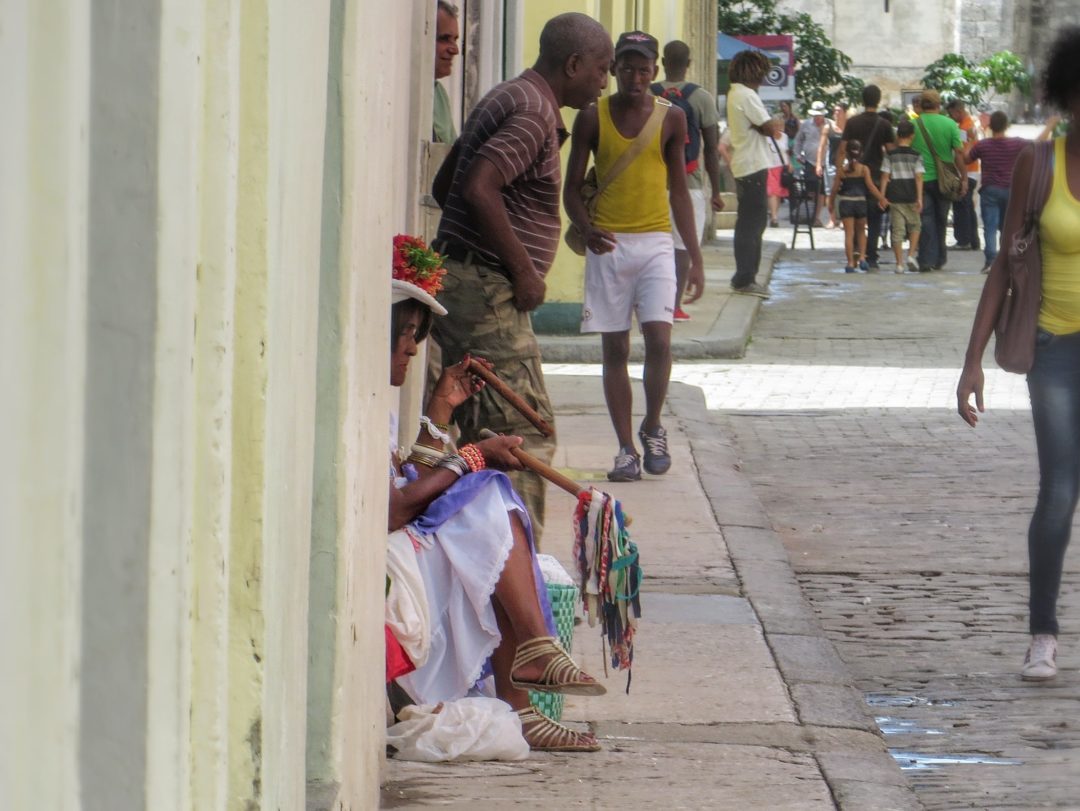
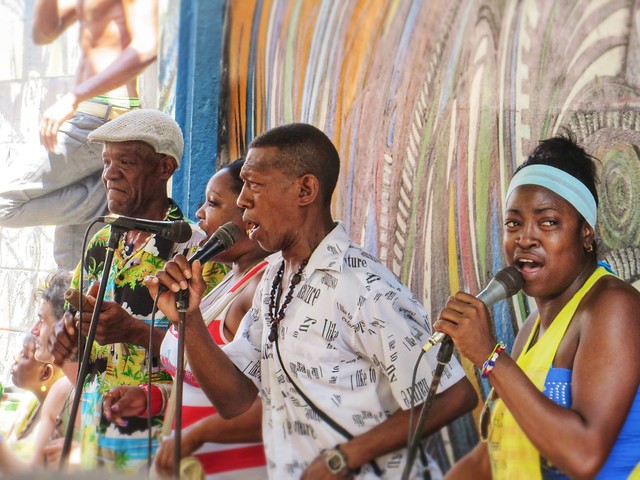
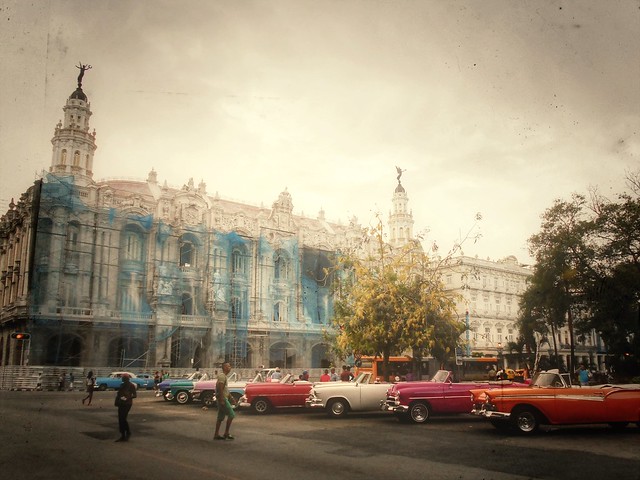
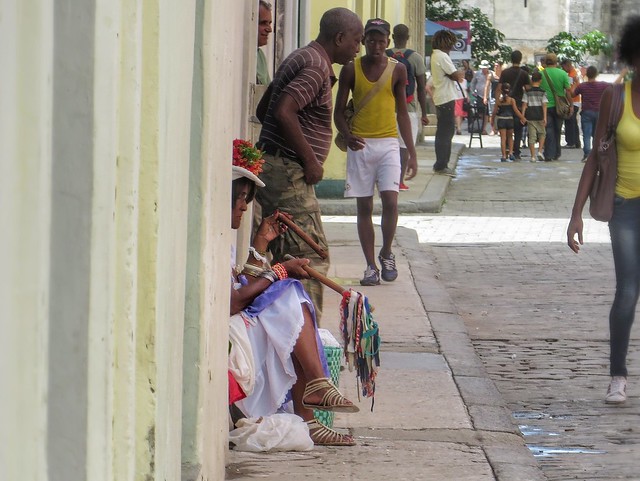
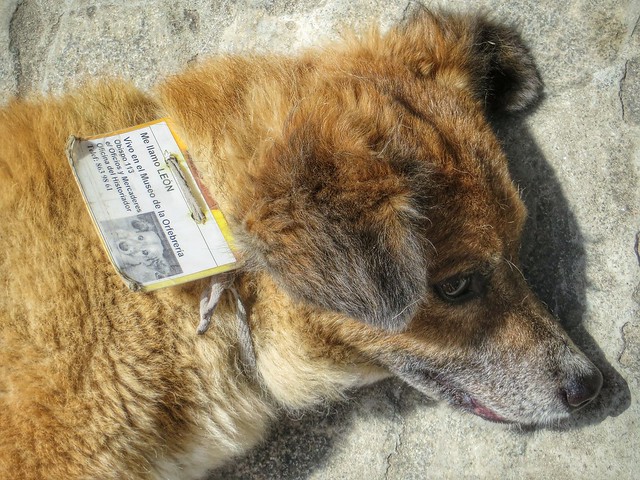
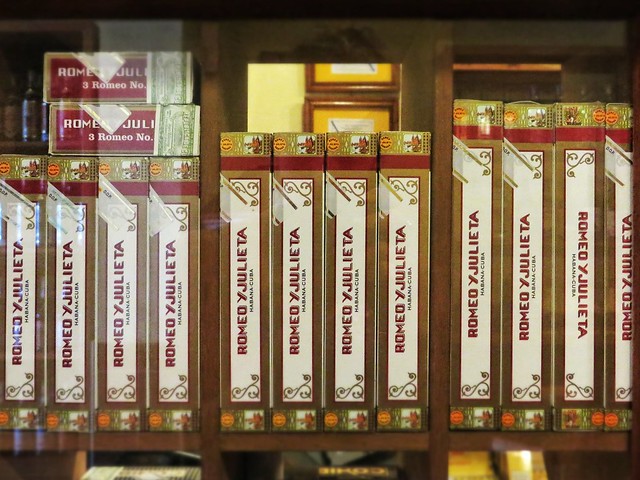

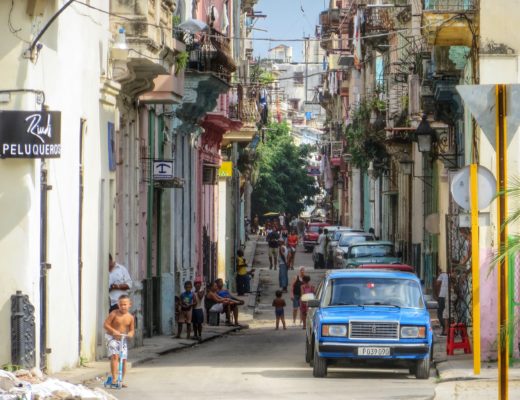
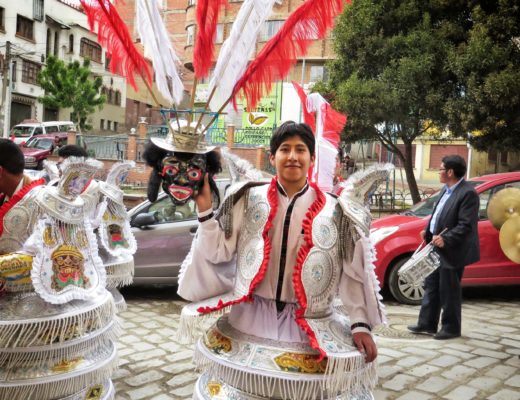
26 Comments
Andrea Anastasiou
July 31, 2014 at 10:47 amI’m really enjoying your posts on Cuba. It’s a shame to read this about Havana, though. Would I be right to assume that it’s not the same or as bad away from the touristy areas or in other parts of the country?
Flora
August 4, 2014 at 7:32 pmIt’s definitely different in other parts of the country – not as intense or common, and easier to handle. Hopefully it’s obvious from the article that it isn’t a constant battle with the jineteros in Havana: they’re just quite persistent and I thought rather strongly about the reasoning behind the activity.
Megan Kennedy
July 31, 2014 at 2:14 pmThank you for your post, I’m going to Cuba for two weeks in December and have heard about the jineteros in Cuba. Does pretending you only speak English help at all? I understand it wouldn’t deter all of them.
Flora
August 4, 2014 at 7:35 pmMy friends and I pretended to only speak English, then Swedish, Russian, Mandarin… it doesn’t make much difference as a lot of jineteros know a few key phrases in a multitude of languages! I actually found pretending to be Spanish/from South America helped me out a lot more!
Amanda
August 1, 2014 at 12:32 amBut Flora… you’re supposed to be having LOCAL EXPERIENCES everywhere you travel!! 😉
Havana definitely illustrates how tough that is in some cultures. I’m really enjoying read about your experiences there!
Flora
August 4, 2014 at 7:42 pmBut I can’t handle so much local experiencing!!..
Jonas
August 1, 2014 at 7:46 amI was in Cuba for two weeks and I had about the same experiences with jineteros/as in Havana. As a single male traveller I also dealt with prostitution, it bascially exists everywhere even if it’s prohibited, and especially at night clubs. When I returned to Havana after visiting Vinales and Trinidad I stayed in a less touristy area which I liked better. I was also more confident when walking around the city and met some nice people in shady pubs, it’s also really cheap when paying in Moneda nacional even if it might be a bit controversial.
Flora
August 4, 2014 at 7:44 pmInteresting Jonas – the prostitution aspect of hassling was one thing I didn’t have to deal with. And yeah, when I returned to Havana at the end of the month I stayed in a much less touristy area and felt a lot less conspicuous..
Beatrice Chartrand
August 1, 2014 at 1:31 pmGreat post Flora! I am going to Cuba in a week. Did you pay every time you took a picture? Seems excessive! Its unfortunate. Your post is very helpful and I will likely not engage in small talk with locals or at least be more aware.
Flora
August 4, 2014 at 7:48 pmNo I didn’t pay for the pictures I took, but that’s because I was relatively sneaky and took zoomed in photos from far away..! Probably not the most honest thing to do but I only shot two or three images of people dressed up and charging for photos, and they definitely didn’t pose for me.
I wouldn’t say “don’t talk to any locals” though, because that’s half the reason for travelling in my opinion! Just understand that a lot of the conversations you’ll have may be orientated towards getting money from you..
Katie @ The World on my Necklace
August 4, 2014 at 2:48 amThanks so much for writing an honest post with the not so nice side to Cuba. I have read so many blog posts and articles about how friendly the Cubanos are with no mention to why that is so – to solicit money from the ‘rich’ tourists. I am sure there are some friendly locals that are just interested in meeting visitors to their country but it would be naive to assume that they are in the majority.
Flora
August 4, 2014 at 7:50 pmThanks Katie! I don’t want to present a bad picture of Cuba in general but I do think it’s necessary to know what Havana can be like – both good and bad.
Julius
August 6, 2014 at 10:56 amHi Flora, original Romeo y Julieta cigars are ideed the best. Like them more than Cohiba or Montechristo. Good text but I enjoyed the atmosphere of Havanna very much.
Julius
Flora
August 13, 2014 at 5:17 pmThanks Julius – I definitely wouldn’t be able to tell the difference between Cuban cigar types :p I also enjoyed Havana, but the jinetero culture was an intrinsic part of my experience in the city and not something I could avoid talking about.
Jo
August 6, 2014 at 1:52 pmI can definitely relate to this, I actually wrote a blog post about it the other day! I loved Cuba and really liked Havana, but it definitely got tiresome having to fend off the jinteros.
We made good friends with a student from Santa Clara. I think we were probably fairly cool towards him at first simply because we thought he was going to sell us something. It’s really sad how it makes one suspicious of every friendly person in Cuba.
Flora
August 13, 2014 at 5:19 pmArgh I can imagine how bad you felt when you realised he just wanted to be friends!
Peter Korchnak @ Where Is Your Toothbrush?
August 15, 2014 at 12:24 amOh, the memories. Yes, I did meet hustlers in the streets of Havana. The lazy ones went straight into asking if I wanted cigars or girls. The more elaborate ones would typically start with a loud, smily, “Happy holidays!”, follow up by asking how long I am in Cuba and what I am looking for, and finish with the cigar/chica pitch.
I found the following tactics helpful to ward off hustlers and prostitutes in the streets of Havana:
– The Finger (Not the One You’re Thinking Of): At waist level, face your hand outward, stick your index finger up and shake it side to side. The NO the gesture implies was often very powerful.
– The White Plastic Bag: I noticed Cubans carry their precious purchases of groceries in white plastic bags. Once a friend gave me something and put it in a white plastic bag. I walked from Plaza Vieja all the way to Capitolio dangling the bag by my side and was not disturbed once.
– The Ring: Approached by a real prostitute jinetera, I would just smile at her, shake my head, and stick my wedding ring up in front of my face.
– The Slovak: As a native of Slovakia, I’ve found this helpful in many places around the world. When someone would start speaking to me, I’d just respond in Slovak. They would scurry away for easier prey pretty quickly.
It also helps to avoid places like Calle Obisbo and other touristy spots (see them once and go to more interesting parts of town, Havana is big enough).
Flora
August 21, 2014 at 9:13 pmThanks for your tips on coping with Cuban jineteros, Peter – I never tried the wedding ring technique, despite using it in other countries, the white plastic bag trick sounds like a stroke of genius!
Donna Starr
April 3, 2017 at 1:11 pmGreat ideas – yes, speaking a real foreign language will usually do it. I have my dozen phrases in Farsi at the ready if necessary. When I was in Cuba, I found that really early in the morning was a good time for a long walk and the locals enjoyed chatting then. After that, they are all business – looking for ways to make dinero, and who can blame them? I met many nice Cubans but you need to take the time to be genuine and friendly and speaking Spanish helps, too!
Melissa | Suitcase + Heels
January 20, 2018 at 9:15 pmI once got out of a scam situation in Paris by busting out some Korean phrases when my repeated “No” didn’t work. Since I’m a pasty white Canadian girl, a string of Korean confused them enough that I was able to walk away. 😛
Francesca
January 25, 2015 at 6:50 pmVery interesting – I am just back from Cuba and had very similar experiences. My boyfriend and I speak fluent spanish and had chosen to stay in Vedado in a casa as opposed to Havana Vieja. On arriving (tired and a bit jet lagged!), we took a brief walk round to explore and were approached by a guy who started to talk to us – we were initially cautious but he was very friendly, didn’t try to sell any cigars or women, and we went for a drink in a bar with him. We later discovered this was a commission bar (5CUC a drink) but at the time were not familiar with prices. After a couple of drinks and a lot of conversion and jokes we went to a restaurant he recommended (again obscenely overpriced but were not aware at the time), he left us while we ate. At this point we were super enthusiastic about Cuba and Cubans and he had gotten our trust very well. He came by later to see how we had enjoyed it and brought his “wife” to introduce to us, who wanted to check he had not been late to dinner for being with a woman… again they spend another hour with us, THEN he does a sell for a box of cigars from his friend who works at the factory. Having built our trust over a whole night we then end up leaving with obviously fake and overpriced cigars – not having dawned on us until we got back to the casa exactly what had happened. It ruined a lot of our trip as we were very suspicious of talking to other cubans and actually felt like he had tricked us in a mean way and only saw us as walking CUCs despite having pretended to enjoy hanging out in the bar.
Lessons – never say you have just arrived (all people who approached asked this first, if we said we had been there a week, they usually backed off knowing you had been scammed already!), be aware of how much things cost and say ‘demasiado carl’ when it is, don’t believe when they all say ‘aqua informacion es gratis’ – it may be free initially but there is a payout later!
We did meet people through the owners of the casas stayed at (much better idea) and met some very nice people BUT I do think a lot of Cubans see tourists as walking CUC only and are justly resentful of the freedom and travel of the west.
Flora
January 25, 2016 at 5:41 pmIt’s definitely difficult to feel positive about a country when someone local essentially grooms you for their own gain – and even worse when you think you’ve become friends with them! Sorry that happened to you, Francesca.
See Ming Lee
January 15, 2016 at 5:21 pmHey Flora, enjoyed this article, and reading between the lines (you’re bilingual, distinguish between ‘tourist’ and ‘traveler’, and have a head on your shoulders), I soon realized that my return to the island would bear little resemblance to my trip there before the CUC was introduced. Sure, there were ripoffs and other built in money-sappers, but fairly easily avoided, and this was (1998) even before they started taxing the casas particulares, so fairly easy to bargain the prices there. But after having traveled in China during the FEC period, I know how exhausting that can be, as what would normally be quite reasonable people suddenly have greed encouraged by the government policies. I literally had people in China telling me, “the government says you should pay a different price for everything, so who am I to disagree?”. The communist party document I carried admonishing them not to overcharge a ‘fellow worker’ (I made $150/month in salary) was beyond a joke to them.
Anyways, thanks for saving me a lot of work. I’ve changed my plans to instead try to revisit the Garifuna coast of Honduras and maybe see some parts of Belize I missed earlier. Cuba can wait until the gringo-tsunami washes over the island a few times, and the evil spell of capitalism will bring prices back in line with the nations around it.
Also , I had a trick that worked really well with the jineteros- I befriended one and started helping him sell his homemade cocktail mix on the streets. No other jineteros bothered me from that point on, and even the next few days I was surrounded by this invisible aura, I think I increased his bottom line a little (free publicity as a guero was the product spokesperson), and I got to see the back streets and other side of Habana that so few would venture into. The downside of this approach is that it was actually a lot of work (hardly as much as the hustler endures, of course) and morally speaking I feel bad about selling a product that I wouldn’t be caught dead drinking myself (maybe contained gasoline? or just cheap hooch smells that way to me now). My karma probably caught up with me in Dallas later when I got strip searched and hassled for having visited Cuba.
Happy trails and congrats on the NG award.
K
Flora
January 25, 2016 at 5:44 pmHelping out with the jineteros is such a great idea (and something I can only wish I’d thought of too)! Glad to hear it actually worked 🙂 Although the Dallas situation doesn’t sound like the best…
Sexism and Machismo: the Attitude to Women in Latin America
February 2, 2016 at 11:00 am[…] already realised that Cuba takes street haranguing to new levels, but usually it’s simply a selling tactic – not an act of machismo. […]
From Farm to Factory: the Truth Behind Cuban Cigars
February 2, 2016 at 11:04 am[…] it’s because of the jinetero culture in Cuba, but within minutes of stepping out onto Havana’s humid streets I’d heard the word […]